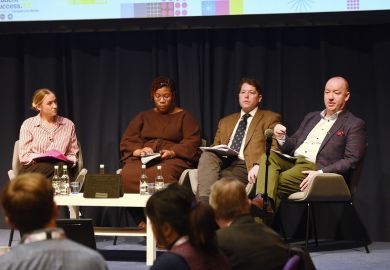Women from the most privileged backgrounds in England who attend a university outside the Russell Group are more likely to be doing shift work or on a zero-hour contract after graduation than their peers who did not enter higher education, a study has found.
The research also found that, no matter what type of university women from the lowest socio-economic background went to, their chances of obtaining secure employment never reached the levels of those with the most privileged upbringings.
Maria Holcekova, a PhD student at the University of Essex, analysed data on 4,281 women in England and found that, at age 25 or 26, women from the most privileged backgrounds were the most likely to be in a secure job.
However, 28 per cent of the women in this group who attended a university outside the Russell Group – typically the most selective institutions – were found to be doing shift work and 3 per cent were found to be on zero-hour contracts. In comparison, among women from similar backgrounds who did not have a degree, only 19 per cent did shift work and 2 per cent were on zero-hour contracts.
Only 16 per cent of affluent women who did attend a Russell Group university were doing shift work and 2 per cent were on a zero-hour contract. This group was also less likely to be “under-employed” – working in a job where their degree was not needed – with 14 per cent of Russell Group attendees in this situation, compared with 17 per cent of those attending universities outside the prestigious mission group.
“It is perhaps due to the high expectations of this group, given their privileged socio-economic backgrounds, that high achievement tends to be ‘rewarded’ but low achievement tends to be ‘punished’ relative to other clusters with regards to labour market security,” Ms Holcekova writes in a paper presented at the British Sociological Association’s work and employment conference.
She told Times Higher Education that “not only is the representation better among the highest socio-economic group of women, in that more go to Russell Group universities, but they get better rewards in terms of job security”.
“I found the effect of certain types of education on certain groups mattered: attending a Russell Group university was advantageous to the lowest socio-economic group, but never as advantageous as for the highest socio-economic group,” Ms Holcekova said.
For example, in the lowest socio-economic group, only 6 per cent of those who attended a Russell Group institution were on zero-hour contracts, which is lower than the 7 per cent who attended a non-Russell Group institution and the 11 per cent for those with no degree. However, it is still a higher proportion than for any of those in the highest socio-economic group, no matter their education level.
Ms Holcekova added that for one of the lower socio-economic groups – which was made up of mostly white women with parents who have low social, economic and educational capital and are the least likely to go to university – none of the surveyed population attended a Russell Group university.
“My findings show not only the different effects of education but also of access to education,” she said. “It shows that higher education is not the golden route to meritocracy so often praised by the government.”
“We need to make sure that women have equal access to different forms of higher education but also that the returns are equal, which they don't appear to be,” she added.
Register to continue
Why register?
- Registration is free and only takes a moment
- Once registered, you can read 3 articles a month
- Sign up for our newsletter
Subscribe
Or subscribe for unlimited access to:
- Unlimited access to news, views, insights & reviews
- Digital editions
- Digital access to THE’s university and college rankings analysis
Already registered or a current subscriber?







